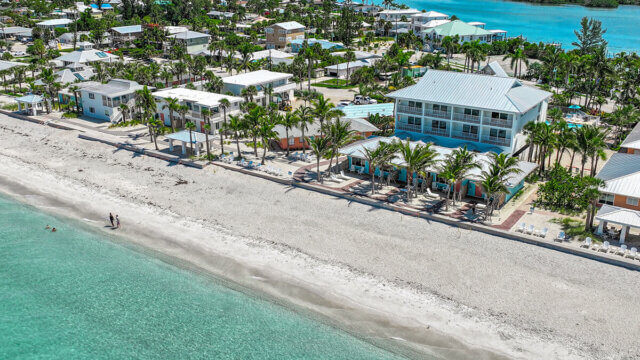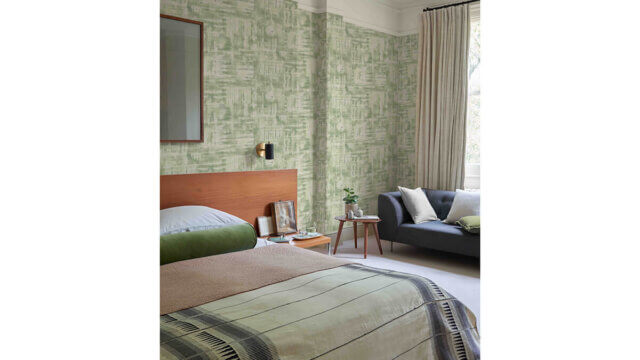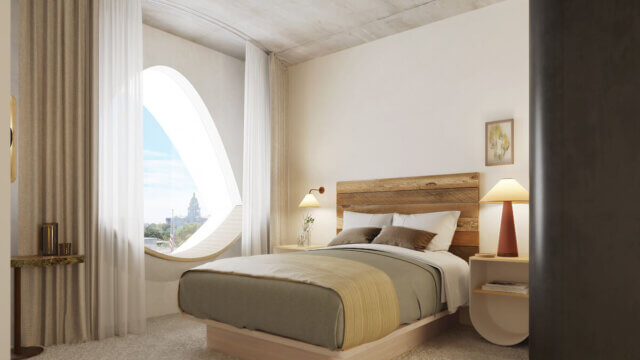As the first hotel on New York’s City’s Roosevelt Island, the recently opened Graduate Roosevelt Island takes inspiration from both the rich history of the island and the future of technology from Cornell Tech on which it is located.
The 224-key, 18-story hotel, which has unobstructed views of Manhattan, marks the entrance to the campus and incorporates a full-service restaurant, indoor-outdoor rooftop bar and 3,600 sq. ft. of meeting and event facilities.
Stonehill Taylor is the architect of record for the project, working alongside Snøhetta, the design architect of the project. “We wanted the hotel to live as its own space, yet one that blends in with the existing Cornell campus to create a family of structures,” said Paul Taylor, principal, Stonehill Taylor. “Perhaps the most striking aspect of the hotel is the lobby space, which recalls Le Corbusier’s soaring ‘Ronchamps’ chapel. To maintain the monolithic character of the ceiling’s acoustical plaster all of the lighting was designed to be indirect.”

The design of that 30-ft. tall ceiling was important in connecting the interior space to the exterior as part of the full campus experience, according to Taylor. The ceiling’s unique trapezoidal wedge shape points upward towards the East River and Manhattan and aligns with the exterior soffit and façade planes to convey the sense of a mass floating above the ground. Unobstructed by lighting, the ceiling is reflectively lit by a fixture along the space’s perimeter. Three-quarters of the wall are glass windows and when paired with hard floors, the acoustics of the space proved challenging. Therefore, Stonehill Taylor employed materials that would both soften the soundscape and accommodate the ceiling’s complex, three-dimensional shape. The wall opposite the floor-to-ceiling windows features 5,000 sq. ft. of shelving with uplighting built into it that bounces off the ceiling above and surfaces below.
Upon entering, guests are greeted with a custom 12-ft. statement sculpture created by Hebru Brantley that reinterprets his iconic Flyboy character and a neon Graduate sign situated above the reception desk, which is a reimagined vintage apothecary cabinet. Nods to the island’s storied history can be seen through the corridor behind the front desk, which features a gallery of black and white photographs of the Roosevelt family.
The lobby is lined with 5,000 linear ft. of textbooks and floor-to-ceiling windows to create a bright and airy space warmed up with Persian-inspired rugs, mid-century light fixtures and pops of Cornell Big Red hues throughout, according to the designers. The lobby is also home to the hotel’s full-service, all-day restaurant with a statement wraparound bar anchoring the space and a variety of inviting lounge seating.
The rooftop bar echoes the form of the lobby and features a terrace with views of Roosevelt Island, the East River and Manhattan. Among the flexible meeting and event spaces is the Minnenhanonck Ballroom, which features a wood herringbone ceiling and a chamfered corner window that has city and river views. Sloped concrete buttresses accent the ballroom space and create a dialogue with the steel construction of the Queensboro Bridge outside.
 The 224 guestrooms and suites include a more than 1,100-sq.-ft. Presidential Suite. Contrasting the modern architecture with warm design details, the guestrooms offer a familiar, residential experience paired with unique views of the East River and Manhattan skyline. The decor plays with technology throughout the ages as seen through lamps with a Morse code of the Cornell fight song on the base, a neon light fixture inspired by a science project from a Cornell alum, floating glass desks and integrated audiovisual devices.
The 224 guestrooms and suites include a more than 1,100-sq.-ft. Presidential Suite. Contrasting the modern architecture with warm design details, the guestrooms offer a familiar, residential experience paired with unique views of the East River and Manhattan skyline. The decor plays with technology throughout the ages as seen through lamps with a Morse code of the Cornell fight song on the base, a neon light fixture inspired by a science project from a Cornell alum, floating glass desks and integrated audiovisual devices.
Local elements and nods to Roosevelt Island are also incorporated throughout the guestrooms. Design highlights include benches upholstered with oil painting-like tapestry of Dutch colonial life, custom art pieces created by Matt Buchholz and Brooklyn-based artist Ashley Cunningham and a gallery wall showcasing unique pieces including portraits of prominent figures in the island’s history such as Nellie Bly and Mae West.
 In 2011, Cornell won a city-sponsored competition to develop a tech and science campus on Roosevelt Island including a hotel that could serve visitors, students and the community. A selection committee of high-profile Cornell alums with ties to the hospitality and real estate industries selected Graduate Hotels for the project in 2016 for its ability to create a highly customized experience that would have a clear and authentic connection to the Cornell campus. Cornell Tech’s Roosevelt Island campus opened in fall 2017. When fully completed, the campus will include two million sq. ft. of state-of-the-art buildings, more than two acres of open space and will be home to more than 2,000 graduate students and hundreds of faculty and staff.
In 2011, Cornell won a city-sponsored competition to develop a tech and science campus on Roosevelt Island including a hotel that could serve visitors, students and the community. A selection committee of high-profile Cornell alums with ties to the hospitality and real estate industries selected Graduate Hotels for the project in 2016 for its ability to create a highly customized experience that would have a clear and authentic connection to the Cornell campus. Cornell Tech’s Roosevelt Island campus opened in fall 2017. When fully completed, the campus will include two million sq. ft. of state-of-the-art buildings, more than two acres of open space and will be home to more than 2,000 graduate students and hundreds of faculty and staff.
The hotel furthers the campus’ ongoing commitment to sustainability through its LEED-rated architecture and the use of highly efficient materials and energy saving systems throughout the property. Its many sustainability initiatives include the LEED-certified architecture, use of recyclable materials, highly efficient heating, cooling and LED lighting systems, reduced water consumption, waste reclamation programs, healthy indoor air quality and more. The food and beverage operators are equally committed to creating environmentally conscious restaurant operations and culinary programs, including composting food scraps, recycling programs for restaurant waste, no single-use plastic products, minimizing food waste and purchasing sustainable, locally-sourced ingredients and products.




